Institute for Digital Health & Innovation
October 9, 2019
Digital Health Stroke Program Reaches Patient Care Milestone

Applause greeted Renee Joiner when she announced a long sought after achievement for Arkansas’ digital health stroke network — getting more than 50% of stroke patients from hospital arrival to treatment in 60 minutes or less. Along with many other speakers, Joiner, director of the UAMS Institute for Digital Health & Innovation Stroke Program, addressed…
September 4, 2019
Awardees Honored for Contributions to Digital Health
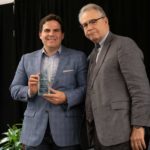
The UAMS-led South Central Telehealth Resource Center recently presented three awards to honor those for their work building networks for and advocacy of digital medicine. The awards were presented at the South Central Telehealth Forum, held Aug. 19 and 20 in Nashville, Tennessee. The resource center serves Arkansas, Mississippi and Tennessee. It functions primarily through…
August 9, 2019
UAMS Partners With Arkansas Blue Cross and Blue Shield to Expand Comprehensive Digital Health Network
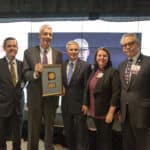
A $1 million grant to the University of Arkansas for Medical Sciences (UAMS) from Arkansas Blue Cross and Blue Shield will enable the UAMS Institute for Digital Health & Innovation to advance digital health statewide to provide patients better and more streamlined access to health care. The grant was announced today as leaders from UAMS…
May 3, 2019
FCC Commissioner Impressed by UAMS Digital Health Initiatives
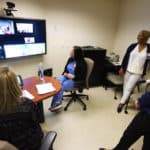
UAMS’ pioneering work in bringing health care to those who need it through digital health applications has drawn the attention of a top federal official who traveled from Washington D.C. to UAMS recently to see for herself. Jessica Rosenworcel, a commissioner on the Federal Communications Commission, visited April 29 with UAMS Chancellor Cam Patterson, M.D.,…
March 7, 2019
UAMS-Led Stroke Program Helps Lower Arkansas to Seventh in Stroke Deaths among All States

Arkansas recently fell from sixth to seventh place in the nation in the number of stroke deaths per capita, a huge improvement that health officials credit in part to a statewide telemedicine program of stroke education and treatment led by the University of Arkansas for Medical Sciences (UAMS). Only four years ago, Arkansas still was…
February 21, 2019
UAMS Establishes Institute for Digital Health & Innovation; Curtis Lowery, M.D., Named Director

The University of Arkansas for Medical Sciences (UAMS) has established the Institute for Digital Health & Innovation, and named Curtis Lowery, M.D., as its director.
January 31, 2019
UAMS-Led Arkansas Stroke Program Named National Hearst Health Prize Finalist
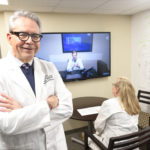
The Arkansas SAVES telemedicine stroke program, led by the University of Arkansas for Medical Sciences (UAMS), has been named one of three national finalists for the 2019 Hearst Health Prize for Excellence in Population Health.
January 28, 2019
Oklahoman Glad He Was in Arkansas When He Had Rare Stroke
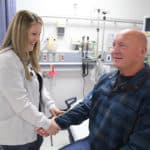
Being far from home but in the Arkansas SAVES network may have saved Donny Koger’s life.
A resident of Oklahoma City, Koger was in a wilderness area of Polk County on the western border of Arkansas late in the evening of March 16 when he suddenly found he was unable to speak and was paralyzed from the neck down.
May 18, 2016
Mega Brain Debuts at Strike Out Stroke Nights
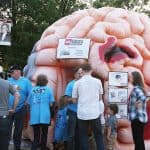
May 18, 2016 | The 5-year-old boy’s eyes were wide with wonder outside busy Dickey-Stephens Park in North Little Rock as he spied not his baseball hero but the giant, inflatable Mega Brain. Mega Brain was there May 5 for Strike Out Stroke night, an event to raise public awareness about stroke that is organized…
May 12, 2016
Stroke Program Helps Lower Arkansas to Sixth from First in Stroke Deaths

May 12, 2016 | Arkansas recently fell to sixth in the nation in the number of stroke deaths per capita after many years in first place, a huge improvement that health officials credit in part to a statewide telemedicine program of stroke education and treatment. The program — Arkansas Stroke Assistance through Virtual Emergency Support, or…
Previous page Next page